- Home
- Dusty Richards
Massacre at Whip Station Page 19
Massacre at Whip Station Read online
Page 19
Now Isaiah had no answer—other than to consider what B.W. had said and then kick the bottom of the box hard. That caused the horses to jump again and B.W. being forced to steady them once more.
That was when, from somewhere behind them, they heard a horse whinny.
Isaiah and B.W. were both immediately tense. Motioning Isaiah to sit still, B.W. ducked low and stole a look back. Then he sat back up.
“Three riders,” he said.
“How many Rebs was there?”
“More ’n that,” B.W. said. “But who knows what their strategy is or if these are even them.”
“They got horses, though,” Isaiah said.
“Of course, but—” B.W. began, then stopped. “I see. We go one way, you go another.”
Isaiah nodded gravely.
“But brother Isaiah, that don’t change nothin’,” B.W. said. “You kill Diamond, you die.”
The black man said thoughtfully, calmly, “I gotta go where my wife and son is. That’s all I know.”
Then, half-turning so as to be heard, he told the riders to come forward slowly.
CHAPTER 17
When the arrow struck Ridgewood, Kennedy and Hathaway both scurried from the dead man as if he were a lit keg of black powder. They had no destination in mind, other than to get away.
Their instincts were good even if their execution was not. Almost at once, arrows struck the ground where they had been just moments before. Kennedy heard them penetrate the ground, hard.
With no cover, Hathaway belly-crawled as low as possible while Kennedy tucked his arms in and rolled.
Away was all the Indian agent thought. Get away.
There was nothing but survival in Kennedy’s head until he tumbled into a ditch. The long, grave-like hole had been part of the earth fall that created the crevasse. All that Kennedy cared was he fit inside. He stayed there, facedown, panting, listening. He heard Hathaway’s scrabbling off to the west, his shoes and the knees of his britches on pebbles, his breath coming in short busts. Then Kennedy heard hoofbeats. He could not be sure how many or where they were headed, exactly, other than they were coming in his direction.
He heard the whoosh of more arrows flying wide. He heard no cry from Hathaway. If he hadn’t been so concerned about his own fate, he would have hoped a little stronger that his partner was still alive.
The hoofbeats stopped. The silence was miserable. Kennedy imagined the Indians were listening. He pushed his face down into the ground, his lips pressed on cold, dry dirt, hoping to stifle his breath. He sucked air through his nose. He also waited for the anticipated flash of pain, imagining that a lance or tomahawk would pierce his spine or shatter his skull. Savages were nothing if not brutal . . . and quiet. A quick death or scalping was what he would get if he were lucky. If these were Apache, it might amuse them to take a day or more killing him with knife and fire . . .
The horses suddenly charged, but not at him. They were racing around him, ahead to the north. The sound, and the trembling of the ground, receded. Then there were other sounds, other hooves, and the vibration of the earth started again. With those came the clatter of metal on leather.
A full canteen, he thought, recognizing one sound. A sheath? For a saber? Pray God, was that a bugle? Cavalry?
What sounded like a small herd of horses drummed past him. One actually jumped the pit without stopping on the other side, apparently not knowing he was there. He turned his face up, saw flashes of blue in the moonlight, and laughed with relief.
It was the United States Cavalry.
The relief and the big, involuntary smile were short-lived as Kennedy realized he would have to explain the dead and dying and whatever Confederate markings were on the other men . . .
Dying, he thought, thinking of Mute. The last thing he needed was a simple man telling the soldiers the reason they were out here.
Kennedy pushed off on his hands and knees. He remained kneeling and looked around. He saw a soldier helping Hathaway up, another two riding over to Ridgewood, two more headed over to Mute. And an officer—a major—seated on his horse, circling around and looking at the carnage. He was probably trying to reconstruct the battle.
It was he who spotted the Indian agent in the ditch.
“There!” the major shouted.
Others looked on as the officer rode over. He dismounted at the north end of the pit.
“Major Howard out of the San Diego Barracks,” he said as he bent and extended a strong, helping arm to Kennedy.
The Indian agent took it gratefully.
“Doug Kennedy of the Bureau of Indian Affairs,” replied the man as he half-stepped, was half-pulled from the ditch. Kennedy looked up at the officer’s shadowed face. “The other gentleman is my associate, Jessup Hathaway. I—we—thank you, sir, for coming to our aid.”
“I’m glad we were here, though it was happy chance that we were so,” Howard said. “We were on patrol and saw the bodies of these unfortunate men. Who attacked you and where did they go?”
“There were three Indians, I think,” Kennedy said. “I could not see any attire or markings, or if there was war paint. They rode north—when they heard you, I suspect.”
“So the tracks indicate,” Howard said. He took the canteen from his horse, offered it to Kennedy. “And you, sir. What were you two doing out here? And with these Confederates?”
Kennedy poured a palmful of water and used it to clean his face. He also used it to buy time to think. As he did, his gaze caught that of Hathaway. From the other man’s frozen expression, it seemed as if he, too, were waiting for an explanation.
As always, Kennedy thought, something closest to the truth works best.
“We were passengers on the Butterfield stage,” Kennedy explained. “Our assignment was to escort a Serrano medicine man home after his meeting with President Johnson.”
“A Redskin met with the president?” Howard asked.
“He did indeed. It was a show of support for our humble efforts out here,” Kennedy said, touching his chest. “Something for the press.”
“I understand,” Howard said. “Printer’s ink is as good as gold.”
“That was the plan, anyway,” Kennedy said. “We were—put off the stage, left to die out here by men we met at the last way station. O’Malley, I think. Wasn’t that their name, Jessup?”
“Joe O’Malley,” the other man agreed.
Having two men confirm a story was better than one, Kennedy thought.
“I’m not from around here,” the major said. “I don’t know him.”
“From what we were able to figure, their job was to deliver the shaman to these Rebels,” Kennedy went on. “What they wanted him for, I cannot say. But it could be that the Indians who shot at us thought we were helping them—I don’t know.”
“I see,” Howard said. “Where is the stage now?”
“North, maybe an hour away. Two at the most.”
Howard watched as his men gathered the stray horses. He took a step toward them. “What about those men?” he yelled, pointing toward the nearest of the fallen.
“Both dead, sir,” a soldier reported.
“Thank you, Private,” Howard replied.
Kennedy exhaled. Hathaway’s expression relaxed.
Major Howard removed his white gloves and slapped them in an open hand. “Chasing Redskins is dangerous enough in daytime,” he said. “They could lead you into an ambush. The thing about the medicine man concerns me, though.”
“Why is that?” Kennedy asked, washing out his mouth with a slug from the canteen.
Howard regarded him in the dark. “You being a government agent and all, I guess it’s all right to say.”
“If it has to do with the Indians—”
“That’s what I mean,” the major said.
Hathaway walked over then and, with Howard’s permission, Kennedy passed him the canteen. Behind the major his men were busy gathering stones to temporarily inter the bodies.
“I s
aw a message at our camp regarding a stagecoach station and Indians,” he said. “There was something about night pursuit as well.”
The two Indian agents were both alarmed and intrigued.
“Who was the message from—and who was it to, if you don’t mind my asking,” Kennedy said.
“It was from a doctor and it was to a general,” Howard replied.
“Was the doctor’s name Peterson, by any chance?”
The major shot him a look. “It was, yes. You know him?”
Kennedy nodded. What he did not know was why Peterson was delivering secret messages to a cavalry encampment.
“You don’t have to tell me any names, but the message,” Kennedy said. “It was to an officer locally?”
That was right at the tipping point of confidential. “I am not at liberty to disclose military details.”
“Of course,” Kennedy said, affecting embarrassment for having asked. In reality, he was damned curious. Peterson should not have been in communication with anyone, let alone a general.
“One more question, if you don’t mind,” Kennedy said. “Your being out here had nothing to do with that message, did it?”
“Not directly,” Howard said. “We had no instructions for the night. I don’t like for me or my men to sit around. That’s how dust gets in your soup.”
Kennedy smiled politely at the expression. If anything, he was frustrated by this simple man’s sense of duty. There was a war at stake here.
“Agent Kennedy,” Howard said, slapping his gloves against his thigh now, “would it help the Bureau if my unit and I were to ride you out to the stagecoach? Even if we don’t catch them on the road, we will certainly meet them when they lay over at Oak Grove. If this O’Malley has broken the law, we will detain him until he can be turned over to the San Diego County Sheriff. They have a nice cobblestone jail there.”
“That is certainly where the renegade belongs,” Kennedy said. “He’s a rough man, a liar. The driver, a decent man named Beauregard Lafayette was genuinely afraid of him.”
“That will stop,” Howard announced. He looked from Kennedy to Hathaway. “Gentlemen, are you able to ride?”
“I would welcome it,” Hathaway said as he returned the canteen to the major.
Kennedy simply nodded his assent as the major left to see to the departure.
Hathaway sidled to his partner. “There are loose ends in that ribbon you just tied,” he said. “The girl, whoever was shooting at us from the other side of the ravine, the passengers—”
“It will be our word against theirs,” Kennedy assured him. He nodded toward the major. “Who is that government employee going to believe? A grizzled old man or two solid citizens who have the same superior as he does?”
“Fair point,” Hathaway agreed. “But what about Peterson?”
The stocky man nodded. “That has me perplexed. I never did trust him.”
“Nothing to trust,” Hathaway agreed. “Always contrary. And he just up-and-left Crane, it sounds like. Not even good doctoring.”
“No. For whatever reason, seeing Major Howard was more important. I’m thinking,” Kennedy went on, “it could have something to do with people he met during the War. Maybe he has a separate operation.”
“Not the surgical kind,” Hathaway said, not trying to be witty but clarifying.
Howard and his men were mounting up and the two men from Washington did the same. One of the cavalrymen peeled off and headed south.
Probably to alert the rest of the column of their plans, Kennedy thought. It reminded him of Washington protocol with young pages and interns running this way and that bearing messages. It was a wonder they didn’t confuse things with all their rushing and crisscrossing more than they straightened them out.
Within minutes, they were rounding the ravine to pick up the trail of the stagecoach—and Joe O’Malley.
* * *
“It’s Slash O’Malley, Isaiah.”
The young man spoke clearly as he rode, unafraid, toward the stagecoach.
“Who’s with ya?” B.W. called back.
“Me, Joe,” the boy’s grandfather shouted. “And Miss Clarity. Where’s all your goods?”
“Weakened wheel, hadda leave it. Slash, what’re you doing back?”
“Met and unhorsed the Rebs,” Slash said. “Those that didn’t run.”
“Bless the Lord for that,” B.W. said. “Glad we don’t have to run no more.”
From the carriage, the preacher yelled, “Can we go back for our belongings?”
“We still got a schedule to try and keep!” B.W. hollered back.
Isaiah stood in the box, one hand on the cabin. “Slash—bring my horse. I’m gonna need it!”
While Slash approached, Joe kicked his horse forward and Clarity followed.
“What’s the urgency?” Slash asked. “An’ why are you stopped?”
“Our new friend here was once owned by Brent Diamond,” B.W. said. “The woman and child who work for him—they’re his.”
Joe swore. He had learned that, in life, there was always a way you wanted something to work out, and there was the way it eventually did work out. They were hardly ever the same. He had an aching feeling in his chest that this would not end well for the figures involved.
Especially you if you get involved, he reminded himself.
But it was complicated because he only knew Brent Diamond as a courteous neighbor who sent over two barrels of water when his own well went dry during a torrid summer and who sent a letter, by stage, complimenting Sarah for pies she had made with cherries he’d sent over on a previous run.
“They reminded me of my childhood home, a memory for which I owe you dearly,” he had written.
As someone who had been held by Comanche for three weeks years back, forced to carry rocks just for the hell of it, he had no gut for the enslavement of any man, let alone a woman and child.
But times wasn’t always what they are now, he reminded himself. Many a time that’s why wars get fought, to correct things like being free states instead of oppressed colonies, or booting a tyrant from Mexico out of Texas.
Years back, Mexicans would’ve been his blood enemies. Southerners, too.
Now they weren’t. But where revenge was concerned, time was rooted where the seeds first fell.
By the time Joe and Clarity reached the stagecoach, Slash was already swapping places with Isaiah. The reverend would have gotten out to embrace his sister save for Isaiah being in his way. The big man held off mounting long enough to insert himself into the cabin and hug his mother, and make a vow.
“I’ll bring my wife and son back,” he said.
“Make sure you come back, boy,” she replied sadly but sensibly. Her spindly arms clung tight around his big neck.
As the farewell played out, Joe was trying hard to think of something to say, not that Isaiah would listen, and B.W. was holding his Bible as though a perfectly right passage would jump from its pages to his mouth. But it was Clarity who spoke and surprised everyone, uttering words Joe had heard before.
“I’d like to ride with you,” she said to the man she just met.
The freed slave held up. He looked her over in the pale light. She appeared feminine enough but she was armed like she was ready for war.
“Why would you do that?” Isaiah asked.
The door was still open beside the big man and, with just enough room, Reverend Michaels leaned out.
“Clarity, the man is right!” the pastor yelled. “This is not your affair!”
“Neither was this,” she added, nodding toward the stagecoach.
“Sister, you could die!” Michaels said, choking out the word.
“True enough, but I can also live the way I think I was meant to,” she replied. The woman turned back toward Isaiah. “These other men will attest that I am a dead-shot and have no stomach for men who bully women. Or children.”
“She’s all that,” B.W. heartily agreed. “Seen it with these very ey
es.”
The black man used his knee to shut the door, jolting Reverend Michaels back into his seat. Then he climbed into the saddle. Isaiah sat so hard it was as if he was intent on joining man-flesh to horse-flesh.
“You know the way to Vallicita?” he asked.
“It’s directly back the way we came,” she said. “If we ride through, we’ll be there early morning. I can let you know before we come into view.”
Isaiah pursed his lips as emotion rolled up into his throat. He coughed to clear it.
“Then I thank you and accept your generosity.”
“Clarity!” Michaels half-sobbed, finally finding his voice as they vanished into the dark. “Clarity, what’s wrong with you, woman?”
“Absolutely nothing,” Joe answered, as heartfelt as he had ever uttered anything. Then he raised his voice and said, “But just a minute. Everybody had their say, now I’ll have mine.”
The eyes of all, save the reporter and the Indian whose eyes were lost in the dark of the cabin, turned toward the speaker.
“I admire your gumption, Miss Clarity,” Joe began, “and your devotion, Isaiah. But has either of you stopped to consider what happens if anyone other than a Red Man happens on a Colored man and a white woman riding alone in the wilderness? Isaiah is shot or lynched, prob’ly both, before he can state his purpose.”
There was a pall of silence that was covered by a finer blanket of something else—a sense of guilt. From Joe to Isaiah, everyone experienced a withering of purpose under the hot sun of reality.
“Now, Miss Clarity—you can say you’ll shoot anyone who tries,” Joe went on, “and maybe you could. Then you got bodies behind you and a posse in pursuit. That’s the way it is and everyone here knows it.”
Isaiah did not allow another moment to pass. He hurt to get on with his business.
“Mr. Joe is right and I’m sorry he is,” the black man said to Clarity as he ended the brief partnership. “I thank you again.”

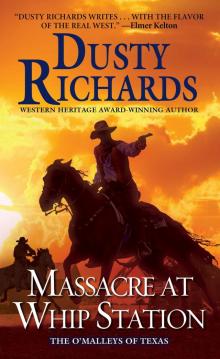 Massacre at Whip Station
Massacre at Whip Station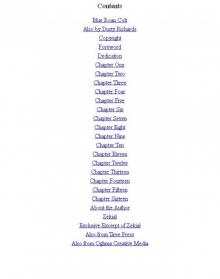 Blue Roan Colt
Blue Roan Colt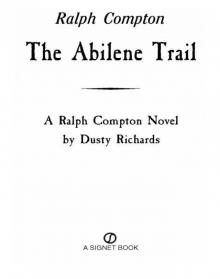 The Abilene Trail
The Abilene Trail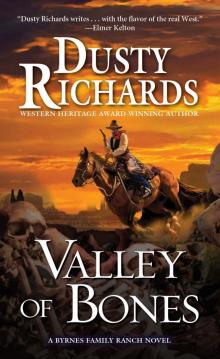 Valley of Bones
Valley of Bones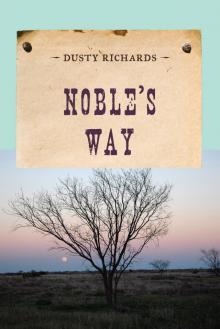 Noble's Way
Noble's Way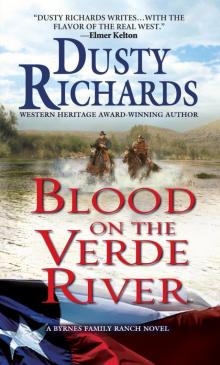 Blood on the Verde River
Blood on the Verde River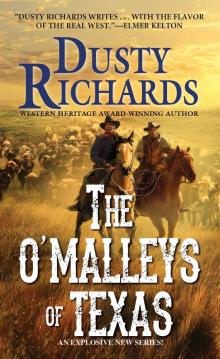 The O'Malleys of Texas
The O'Malleys of Texas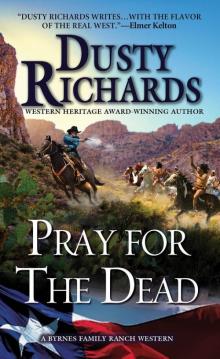 Pray for the Dead
Pray for the Dead Arizona Territory
Arizona Territory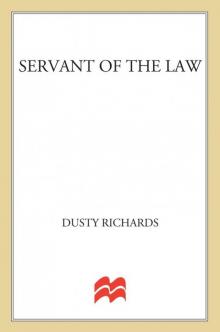 Servant of the Law
Servant of the Law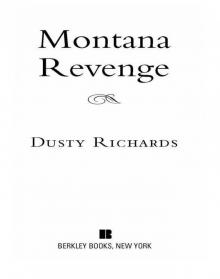 Montana Revenge
Montana Revenge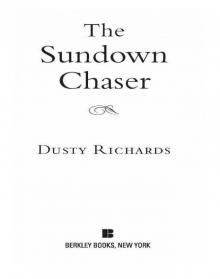 The Sundown Chaser
The Sundown Chaser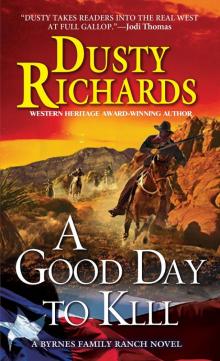 A Good Day To Kill
A Good Day To Kill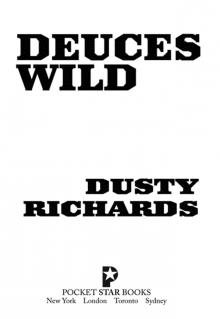 Deuces Wild
Deuces Wild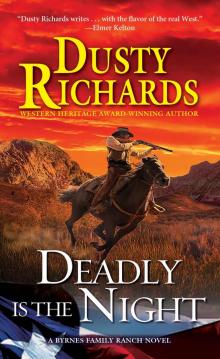 Deadly Is the Night
Deadly Is the Night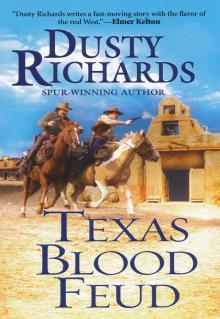 Texas Blood Feud
Texas Blood Feud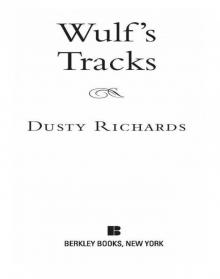 Wulf's Tracks
Wulf's Tracks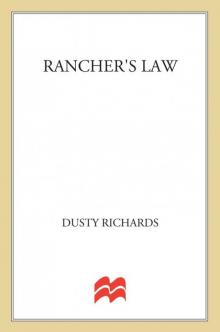 Rancher's Law
Rancher's Law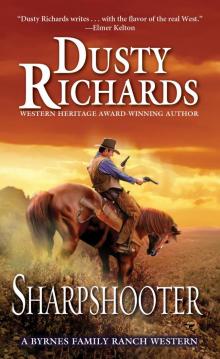 Sharpshooter
Sharpshooter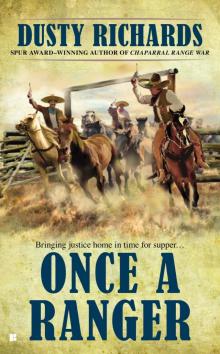 Once a Ranger
Once a Ranger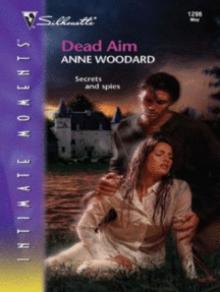 Dead Aim
Dead Aim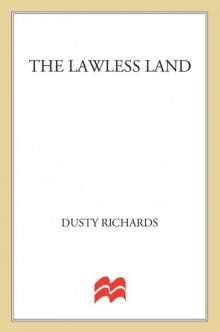 Lawless Land
Lawless Land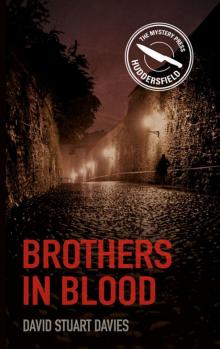 Brothers in Blood
Brothers in Blood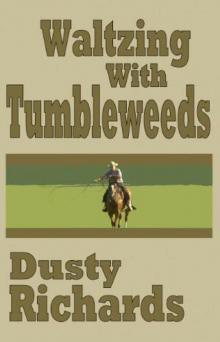 Waltzing With Tumbleweeds
Waltzing With Tumbleweeds